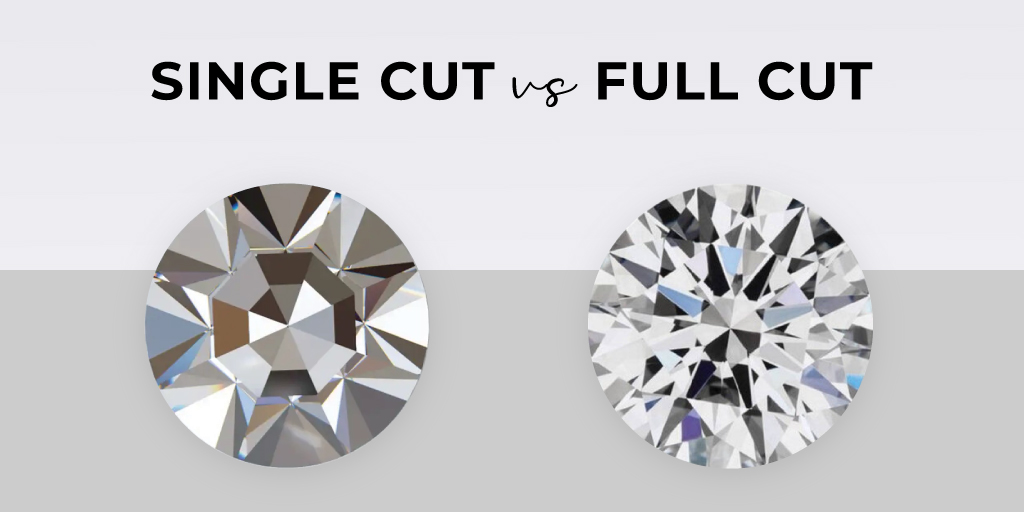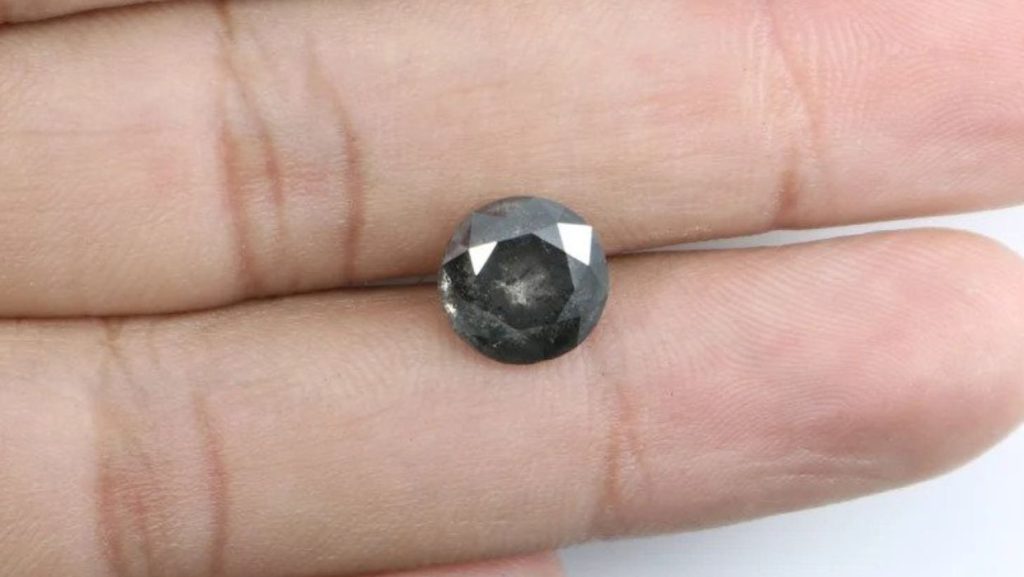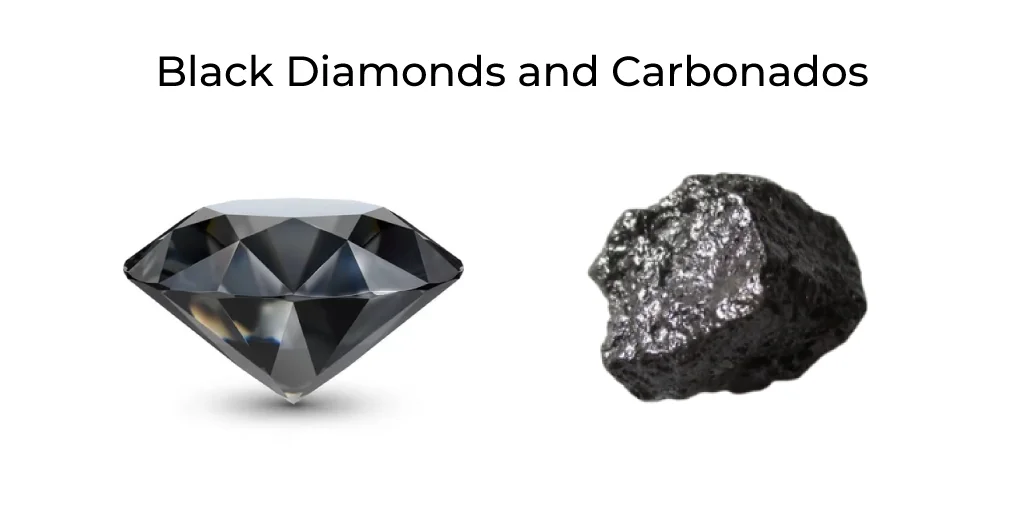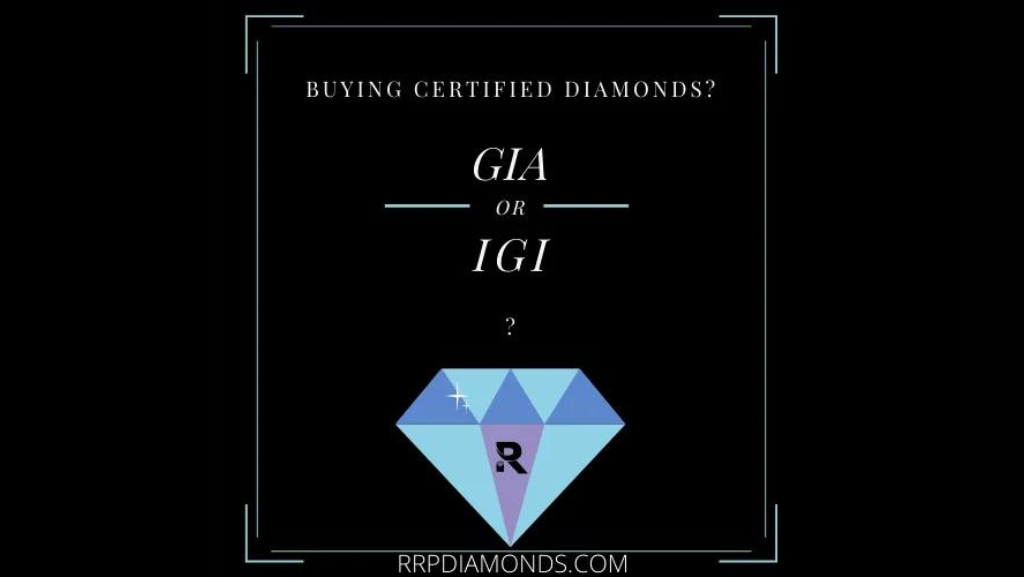
If you are buying a diamond, you want to be sure that it is the real deal, and it has all the characteristics that your jeweler is claiming it has. To that end, there are certain companies that provide certification for diamonds. The two big names in the diamond certification business are GIA and IGI. Now the question arises with respect to which one should you choose GIA or IGI?
Often, people get confused about which one is more reliable and how their diamond certification process works. You may also wonder what exactly a diamond certificate contains and whether you should buy a certified diamond at all. If you have similar burning questions, you have landed at the right place.
Since, certification are a crucial part of the diamond industry, a buyer at first must understand the following things;
- Why is a certificate given so much importance?
- Why is it necessary for any purchase you make?
- What is the value/benefit of purchasing a diamond with a certificate?
- What information is contained in relation to the diamond in this certificate?
Only when one understands these important questions can they delve into the certification process of the two popular labs i.e., GIA or IGI.
It is crucial to note that RRP Diamonds exclusively offers all-natural diamonds. This pledge to supply natural diamonds highlights our commitment to ethical sourcing and guarantees clients that the stones they are buying are real, untreated jewels.
What is a Diamond Certificate?
A diamond certification is a comprehensive document issued by a reputable grading institution, detailing various aspects of a diamond’s quality based on the 4Cs – carat weight, color, clarity, and cut quality. This certification gives a reliable assessment of the diamond’s qualities, which greatly increases its resale value.
The certification is a kind of open communication that helps buyers learn more about the diamond they are considering to buy. Expert gemologists use instruments like loupes and microscopes to assess the diamond’s color, clarity, cut, carat weight, and carat size before compiling this official lab report.
A diamond certificate is essentially a reliable document that not only identifies the gem’s characteristics but also helps buyers make educated decisions.
Usually, the certificate will have the following information:
- The shape and dimensions of the stone
- Weight in carats
- Color and clarity grade of the stone
- Standard of the finish of the diamond, for instance, the polish, symmetry, and girdle width
A full diamond certificate will include the following information in addition to the basics listed above:
- The diamond’s reactivity to ultraviolet light (i.e., its fluorescence) can be determined, along with its existence and intensity.
- Table Percentages and Additional Details: How strongly a diamond reflects light is described by these percentages, which represent the diamond’s proportions. The percentage of depth refers to the height of the diamond in comparison to its diameter, whereas the percentage of table refers to the breadth of the diamond’s crown.
- Size of the Culet: The presence and size of the culet, the diamond’s tiniest bottom facet, may be denoted.
- Planning for Flaws and Features: Internal properties (inclusions) and external characteristics (blemishes) of the diamond may be graphically represented on the certificate.
- Further Information Regarding Grading: Additional information, such as the diamond’s particular qualities, inscriptions, or naturals (remnants of the rough diamond surface left on a polished stone), may be included in the certificate.
- Proportions: Assists with visualizing the diamond’s overall appearance and symmetry by depicting its proportions and angles in a diagram.
- Personal Identifier: Each diamond certificate includes a serial number that can be used to locate the original stone.
Buyers benefit from a more complete understanding of the diamond’s properties when they have access to this additional information.
Why Should You Get a Certified Diamond?
In very simple words, a diamond certificate protects you from fraud.
For anyone who is not an expert gemologist, it is hard to judge the quality of a diamond just by looking at it. A diamond certificate proves to you that the diamond has the same carat, color and cut that the jeweler is claiming it has.
If there is no certification with a diamond, you only have the word of the jeweler to rely upon. And they may be the most trustworthy jeweler in the world, but it is still a lot to ask a customer to trust them with something as expensive as a diamond.
Certification is an essential protection when buying a diamond since it helps to avoid any conflicts of interest between customers and sellers. Third-party certification is vital for confirming claims and ensuring the authenticity of the stone, as it can be difficult to rely only on a jeweler’s word.
Having a neutral third party do the grading helps ensure that customers are paying fairly for the quality they are getting, in addition to fostering confidence. Certification laboratories have no financial incentive to give favorable grades to any stones, so their evaluations are always objective.
Diamonds can be easily confused with treated or synthetic stones if they don’t have a credible certificate from a well-established gemological lab. As a result of the possible similarities in appearance and price, dishonest jewelers may try to sell synthetic stones as real ones at a higher price. Protecting consumers from such misleading practices and assuring them of the diamond’s genuineness is where a trustworthy certificate comes in.
All in all, a certified diamond will provide you with the scientific blueprint of the stone, verify its properties and features, and attest that the stone is real. The certificate will also help you if you want to insure the diamond, or if you want to sell it in the future.
Understanding Diamond Quality: A look at the functions of the Grading Labs (GIA or IGI)
There is an abundance of grading labs around the world that certify diamonds. As a consumer, you need to know what the differences between these labs are and what their grading certificates entail.
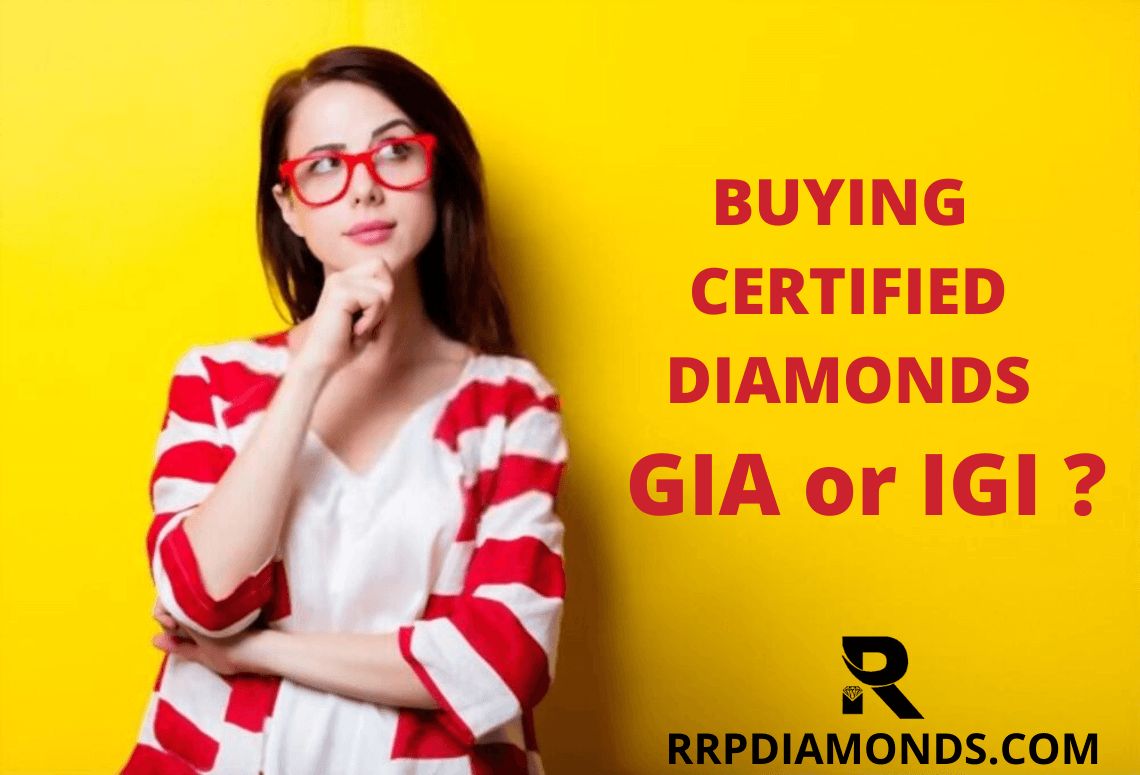
A diamond certificate is an extensive record provided by an accredited grading organization that describes several facets of a diamond’s quality according to the four Cs: carat weight, color, clarity, and cut quality.
A diamond certificate offers a detailed assessment of the diamond’s qualities, which has a substantial impact on its market value. The certificate functions as a transparent means of communication that gives buyers a detailed understanding of the diamond they are buying.
This formal lab report uses the knowledge of skilled experts who carefully assess and measure the diamond using specialized instruments like loupes or microscopes to describe features mentioned above.
If you do not know how a lab operates and what its standards are, you may very well end up paying more for a diamond of inferior quality.
Here is a look at two of the most popular diamond labs in the world: GIA and IGI. Let’s discuss which one you should prefer in the case of GIA v. IGI Diamond Certification.
What is a GIA diamond?
The ‘Gemological Institute of America’ (GIA) is a name frequently heard by those in search of diamond products.
A diamond with a GIA grading represents the peak of independent diamond grading and was developed by the same organization that established the 4Cs.
When vendors say their product is a “GIA diamond,” they’re referring to a stone that has passed the organization’s stringent quality standards.
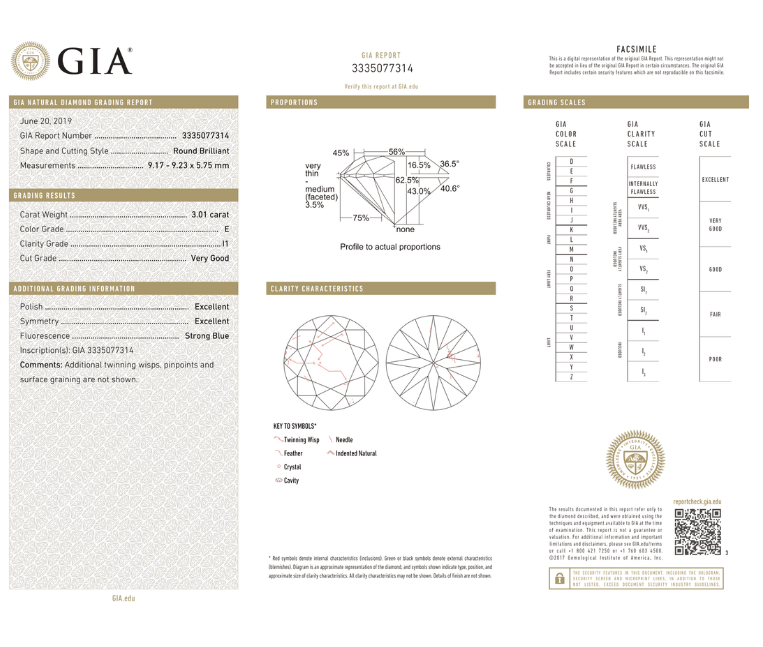 The Gemological Institute of America (GIA) is a nonprofit, nongovernmental organization (NGO) dedicated to advancing the global gem and jewelry industries through its research, education, and certification programmes.
The Gemological Institute of America (GIA) is a nonprofit, nongovernmental organization (NGO) dedicated to advancing the global gem and jewelry industries through its research, education, and certification programmes.
The grading of diamonds is one of GIA’s most well-known services.
This is the leading standard for diamond grading in the world. It is one of the most trusted and reliable names in the industry. The headquarters of the company are located in Carlsbad, California, and have offices in cities all over the world. GIA is currently employing 1400 scientists, certified diamond graders, and educators. Since 1931, GIA created standards used in diamonds evaluation around the world by creating the 4Cs of diamond quality.
In the industry, a certification by GIA is considered to be the gold standard. The company is well-known for its strict standards for grading diamonds, as well as the consistency with which they work. If you are buying a diamond that is graded by GIA, you can rest assured that the quality of the diamond is exactly what is represented in the certificate.
What is an IGI Certified Diamond?
The International Gemological Institute (IGI) has been around since 1975 and has expanded to 18 different labs across the globe.
IGI is the first gemological institute to completely evaluate lab-grown diamonds, a practice it pioneered in 2005. IGI is well-known for its evaluation of both loose diamonds and finished jewelry.
Notably, IGI diamond certification is proud of its speedy certification procedures, running like an efficient system to quickly crank out grade results.
When compared to GIA’s method, which takes a full month to complete, IGI’s certification can be finished in just a few days.
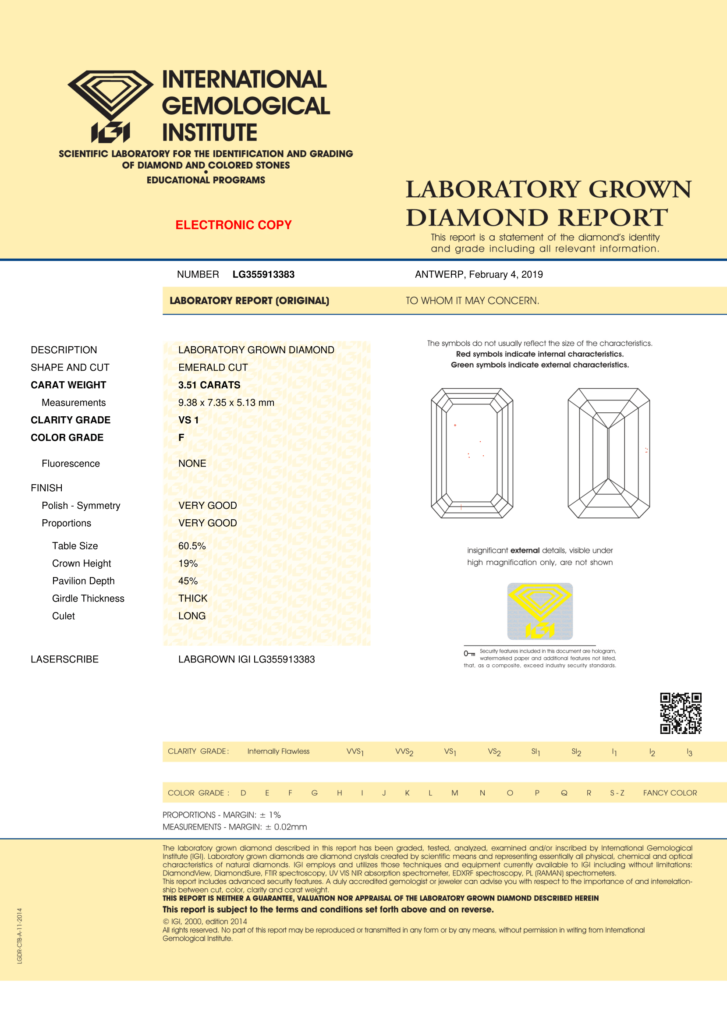 Gemstones and jewelry that seek IGI certification undergo a stringent evaluation procedure that takes into account not only their intrinsic qualities but also their treatment history, carat weight, color intensity, and cut quality.
Gemstones and jewelry that seek IGI certification undergo a stringent evaluation procedure that takes into account not only their intrinsic qualities but also their treatment history, carat weight, color intensity, and cut quality.
By providing an independent and reliable assessment of a gemstone’s quality, this certification helps customers make educated purchases. Furthermore, IGI certification is essential in preventing fraud and misrepresentation in the gemstone trade by establishing a consistent grading and evaluation system.
IGI diamond certification presents itself as a reasonable option for individuals looking for dependable gemstone certification due to its ease of use and low cost.
Accurate assessments of a diamond’s symmetry, natural color according to industry standards, and other crucial aspects like carat weight and clarity are all part of the report included with IGI diamond certification.
The report helps both jewelry stores and customers better comprehend the grading process thanks to detailed graphics. Accurate and trustworthy certification is guaranteed by IGI’s thorough analysis.
Although both GIA and IGI certificates hold credibility from reputable laboratories, GIA certificates enjoy broader acceptance and usage in the natural diamond industry and among jewelers.
When Should You Buy an IGI Certified Diamond?
Even though GIA certificates are more common in the natural diamond certification, that doesn’t mean you shouldn’t consider buying an IGI certified diamond.
Either GIA or IGI can provide peace of mind when purchasing particular stones, such as certain colored diamonds or those on the less expensive side of the price spectrum.
Regardless of the certification agency, buyers can make educated purchases by familiarizing themselves with the distinctions of diamond kinds and taking personal tastes into account.
For example, if you are buying a stone that has a very high color or a stone with F VS1, you are better off buying something that has been certified by GIA. But if you are buying a stone that has slightly lower quality, like a stone with I color grading or SI1 grading, you can consider buying something that has been certified by IGI. This way, you can save some cash without having to adjust too much on quality.
GIA is the industry standard for diamonds above 0.18 carats, but if you are buying diamonds below that weight and you are buying more than one piece, you can certainly consider IGI certified diamonds. This is because when it comes to a studded diamond jeweler, IGI is one of the best labs in the world.
At this juncture, IGI is unique because it uses state-of-the-art equipment designed specifically for evaluating real diamonds used in jewelry. An IGI grading acts as a seal of approval for the quality and authenticity of these diamonds, demonstrating the Institute’s expertise in this area.
Which Certification Should You Choose and Why?
Broadly, two types of diamond certificate types i.e., GIA and IGI are both highly respected laboratories that provide valid certification services in the diamond grading industry. However, GIA is universally regarded as the most prestigious and well-respected institution of its kind.
GIA’s grading standards are widely considered to be the gold standard in the diamond industry. Choosing GIA diamond certification is a reflection of taste and a nod to the highest standards in the business.
When comparing the two labs, the IGI grade for a diamond is typically half a grade or a full grade greater than the GIA grade. A diamond graded as VS1 by GIA may be graded as VVS2 by IGI, whereas a diamond graded as G by GIA may be graded as F by IGI. This exemplifies how precise GIA standards are and why many in the industry place a premium on GIA certification, which is respected around the world.
Since GIA has more stringent standards, you will notice that the diamonds certified by IGI are generally 7-8% cheaper than those graded by GIA. Because the truth is that you may be overpaying for an inferior diamond, instead of getting a diamond of the same quality at a cheaper price.
If you’re ready to start your search, choose from hundreds of styles on RRP diamond Or show us a diamond cut and jewelry you like from elsewhere and we can create something very similar.
Conclusion
In conclusion, whether choosing GIA or IGI for diamond certification solely depends on individual preferences, budget considerations, and the specific characteristics of the diamond being purchased. GIA’s global reputation and stringent standards make it a gold standard, while IGI offers cost-effective options with reliable certification, particularly for smaller diamonds or studded jewelry.
FAQs
Are GIA certified diamonds more expensive?
Yes, GIA certified diamonds are generally more expensive due to the institute’s stringent standards and global recognition.
Is GIA better than IGI for diamond certification?
Yes, GIA certified diamonds are generally more expensive due to the institute’s reputation and detailed procedures for certifying a diamond.
Are certified natural diamonds a good investment?
Yes, certified natural diamonds can be a good investment as their authenticity, quality, and characteristics are verified by reputable grading labs.
How can I verify the authenticity of a certified natural diamond?
You can verify and diamond certificate check can be done by checking the unique identification number on the diamond certificate and ensuring it matches the diamond in question.
Why should I choose a natural certified diamond?
Choosing a certified natural diamond ensures authenticity, quality, and adherence to ethical sourcing practices, providing a reliable investment and a genuine, untreated gemstone
How can I verify the authenticity of a GIA certified diamond?
To verify the authenticity of a GIA certified diamond, cross-check the unique identification number on the diamond certificate with the engraved inscription on the girdle of the diamond, ensuring they match for confirmation.
